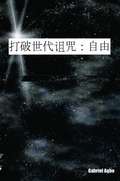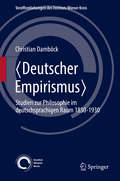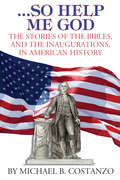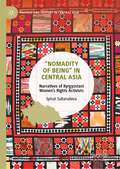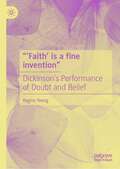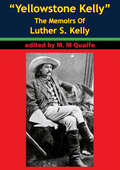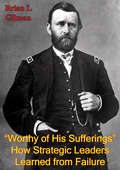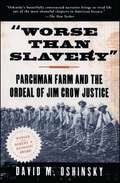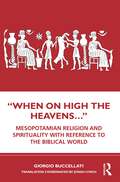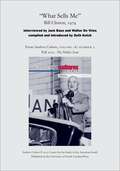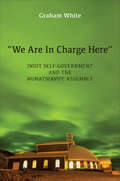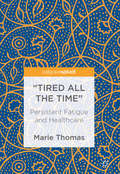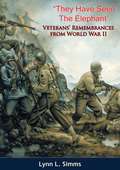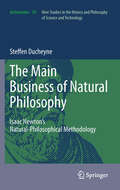- Table View
- List View
打破世代诅咒:自由
by 加布里埃尔·阿博这本书将使你认知到我们的一切行动将对我们和我们的子孙后代所造成的后果,甚至那些尚未出生的孩子。诅咒这个主题长期以来一直被忽视,我们发现有必要在这里揭露它。我们从研读圣经开始,确切地了解上帝对诅咒是怎么说的,它们是如何运作的,以及我们如何才能完全摆脱诅咒。世代相传的诅咒是如此重要,以至于上帝将它们列在十诫的表上。 许多人被敌人用看不见的、无法辨认的奴役工具所束缚。在这项研究中,我们将学习如何打破这些源自敌人的锁链。我们更深入地探索了偶像崇拜(包括万圣节),不道德,背叛,偷窃,谋杀等领域。 我相信,当你阅读这本书并探索其中的真理时,你会振奋地审视自己,并为过一种圣洁的生活而作出深思熟虑的努力,即使不是为了你自己,至少也是为了你的孩子和尚未出生的后代。 愿上帝保佑你,当你继续读下去的时候,我请求你以一颗开放的心和开放的思想去阅读它,这样你的理解就会更加敏锐,更加了解你周围真正的一切事物。
亚伯拉罕、以撒、雅各的上帝
by Gabriel Agbo上帝的圣约应许不会反悔。本书旨在助你实现上帝对你生命的所有应许。经过钜细无遗的研究,加之见证,可以得知上帝有能力也愿意成就对我们作出的许诺。祂说,祂会监守并成就祂所许下的话语。 本书中我们将以批判的眼光构释上帝的应许:上帝缘何许下承诺、上帝会如何持守应许,以及应许如何成就丰硕生命。每个圣约背后都有其缘起、时机和条件,这些我们都要清楚明白,以活出上帝于我们生命当中的美好意愿。毫无疑问,在上帝里一切都有可能! 往下细阅。祝福您!
アフロディーテの贈り物
by Olga Kryuchkovaアフロディーテの贈り物は、ロシアの貴族と文無し騎兵の 18-y の o の娘についての愛の物語です (ハスザーズは19世紀にロシア帝国陸軍の軽騎手だった)。女の子は彼女の両親が彼女のために見つけた男性と結婚したくない-裕福な、高級アール40歳の女の子よりも古い。彼女は結婚式をキャンセルする彼女のお父さんを強制するが、無駄にしようとします。健気な騎兵が誘拐て女の子と結婚。幸いにも、不渡りアールは騎兵の近親者であることが判明し、叔父はすぐにも彼の最愛の相続人である彼の若い甥、と和解する。 この本は、すべての年齢の女性に向けています。
お金。勢力。愛。: A Rebellious Novel
by Joss Sheldon3つの隣接ベッドで生まれた、わずか3秒離れて、私たちの3つのヒーローは本質的に結合されていますが、育成によって分かれています。 彼らの異なる育成の結果として、彼らは3つの非常に異なるもの、すなわちお金、力、愛を追いかけて生活を過ごします。 これは人間の物語です:自分自身のような人々についての物語。状況の気まぐれに苛まれ、最も美しい行為、そして最も下品な行為をしていることがわかります。 これは歴史的な物語です:1800年代初頭の物語は、何もないお金を作り出す力を持った銀行家が今日私たちが住んでいる世界を形作ることができる方法を光らせます。 そして、これはラブストーリーです。同じ女性と恋に落ちる3人の男性についての話です。
〈Deutscher Empirismus〉: Studien zur Philosophie im deutschsprachigen Raum 1830-1930 (Veröffentlichungen des Instituts Wiener Kreis #24)
by Christian DamböckZiel dieser Arbeit ist die Rehabilitierung einer vergessenen Tradition der deutschsprachigen Philosophie des Jahrhunderts von etwa 1830 bis 1930. Das Buch versteht sich als Beitrag zur Geschichte der Philosophie und der Wissenschaftstheorie im deutschsprachigen Raum im neunzehnten und fr#65533;hen zwanzigsten Jahrhundert. Die hier 〈deutscher Empirismus〉 genannte Tradition umfasst als Schl#65533;sselfiguren Wilhelm Dilthey und Hermann Cohen. Das Empirische am 〈deutschen Empirismus〉 liegt nicht in den ,,Sinnesdaten", sondern im abstrakten Bereich von Geist und Kultur. Die wissenschaftlichen Disziplinen auf die sich 〈deutsche Empiristen〉 st#65533;tzen sind prim#65533;r (wenn auch ohne Ausklammerung der f#65533;r die theoretische Philosophie grundlegend wichtigen Naturwissenschaften) die Geisteswissenschaften. Das zeigt sich insbesondere in der von den hier diskutierten Autoren vorangetriebenen geisteswissenschaftlichen Grundlagendisziplin der 〈beschreibenden Psychologie〉. Theoretische Philosophie dient im 〈deutschen Empirismus〉 stets bestimmten praktischen (ethischen, #65533;sthetischen und politischen) Zielsetzungen und erh#65533;lt nur dadurch ihre Rechtfertigung. Rudolf Carnap passt insofern in dieses Bild als auch er, vor allem in seinem Fr#65533;hwerk, von Ideen 〈deutscher Empiristen〉 ausgegangen ist. Carnap erlaubt uns zu sehen, wie diese Ideen in einer Zeit des zwanzigsten Jahrhunderts erhalten geblieben sind, in der die Philosophie ansonsten eher ,,auf den eisigen Firnen der Logik ein zur#65533;ckgezogenes Dasein" zu f#65533;hren begann. Lydia Patton: ,,Deutscher Empirismus demonstrates a profound knowledge of nineteenth and early twentieth century philosophy and science. The work promises to inform and to inspire research in the field, and I have little doubt that it will do so. " Massimo Ferrari: ,,Deutscher Empirismus bildet einen wertvollen Beitrag zur Erforschung der deutschen Philosophie. Es handelt sich um eine sehr eingehende Analyse, die auf ausf#65533;hrlichen Quellenuntersuchungen beruht und zugleich innovative systematische Ans#65533;tze konturiert. " Uljana Feest: ,,Deutscher Empirismus legt eine eigenwillige neue Achse durch die Philosophiegeschichte des deutschsprachigen 19. Jahrhunderts. Entgegen der herrschenden Meinung, dass die deutschsprachige akademische Philosophie in den mittleren 40 Jahren des 19. Jahrhunderts weitgehend zum Erliegen kam und sich erst ab ca. 1870 wieder zu erholen begann, argumentiert Damb#65533;ck, dass ab ca. 1830 im Gegenteil eine vielversprechende, ja ,fortschrittliche' (wenn auch heute weitgehend vergessene), philosophische Tradition entstand. Die Arbeit zeichnet sich durch ein feines Gesp#65533;r f#65533;r die historiographischen Fallstricke des vorgelegten Argumentes aus. Man hat von Anfang an das Gef#65533;hl, es hier mit einem Autoren zu tun zu haben, der den ungeheuren Material- und Detailreichtum der von ihm gew#65533;hlten philosophiehistorischen Epoche souver#65533;n beherrscht. "
…So Help Me God: The Stories of the Bibles, and the Inaugurations, in American History
by Michael B. CostanzoThe author tells the ultimate story of the use of the Bible in the United States with a brief glance back to its first use by Charlemagne in 800 then quickly moves to the beginning of constitutional government in the United States. He tells of the inaugurations beginning with George Washington in New York in 1791 when he placed his hand on a Bible loaned by a nearby Masonic lodge. Following Washington's inauguration, the author tells the story of each Bible, where it came from, how it was secured and where it is now. The story of each inauguration is also told showing the remarkable trajectory of growth in presidential celebrations and the American culture. Presidential inaugurations in other governments, on what is now U.S. soil such as the Republic of Texas, the Confederate States of America and the Republic of Hawaii, are also told. As a prelude to the stories, the author brings into focus the various editions and printings of the Bible to meet the satisfactory demands of different perspectives. It is a complete look at the use of the Book in United States Officialdom. Since George Washington used one in his 1789 inauguration, the Bible has become an indelible part of almost every American presidential inauguration. This book is a history of known Bibles used in every American presidential inauguration. It covers the United States, as well as other governments which had one time or another occupied territories now part of the United States, such as the Confederate States of America, and the Republic of Texas.
„jetzt kommen andre Zeiten angerückt“: Schriftstellerinnen der Romantik (Neue Romantikforschung #1)
by Martina WernliSie schrieben Romane, Erzählungen und Gedichte, sie übersetzten, pflegten umfangreichreiche Briefwechsel und verfassten philosophische Aphorismen: die Schriftstellerinnen der Romantik. Diese Aufsatzsammlung führt die Bestrebungen fort, die Werke der Romantikerinnen neu zu lesen. Wiederzuentdecken gibt es in diesem Band u.a. Benedikte Naubert, Dorothea Veit/Schlegel, Henriette Herz, Johanna Schopenhauer, Helmina von Chézy, Sophie Mereau, Henriette Schubart, Rahel Levin Varnhagen, Caroline de la Motte Fouqué, Jane Austen, Königin Luise, Bettina von Arnim, Adele Schopenhauer, Therese von Jakob-Robinson sowie Dorothea Tieck.
„Wer wird nicht einen Klopstock loben?“: Friedrich Gottlieb Klopstocks poetische Innovationen und ihre produktive Rezeption (Abhandlungen zur Literaturwissenschaft)
by Alexander Nebrig Lutz HagestedtFriedrich Gottlieb Klopstock (1724–1803) war in der Mitte des 18. Jahrhunderts die zentrale Figur der deutschen Poesie. Er revolutionierte Theorie und Praxis des Verses, wertete die Position von Schriftstellerinnen und Schriftstellern im Literaturbetrieb auf, schrieb das wichtigste Epos des 18. Jahrhunderts und ist mit seinen Oden und Gedichten für Lyrikerinnen und Lyriker weiterhin mustergültig und stilbildend. Die 26 richtungsweisenden Beiträge der internationalen Quedlinburger Konferenz, die im 300. Jubiläumsjahr Klopstocks erscheinen, diskutieren die innovative Leistung dieser Dichterpersönlichkeit sowie die facettenreiche und vielseitige Rezeption seiner Werke.
„Narren in Christo“: Jehovas Zeugen im literarischen Erinnerungsdiskurs Überlebender des Nationalsozialismus (Studien zu Literatur und Religion / Studies on Literature and Religion #5)
by Nathan SchmidtchenDie vorliegende Studie ist die erste, die den Erinnerungsspuren nachgeht, die Jehovas Zeugen (Bibelforscher) in den Erzähltexten Überlebender des Nationalsozialismus hinterlassen haben. Trotz unterschiedlicher Erinnerungskulturen und -interessen seitens der Autoren ergibt sich ein einheitliches und zugleich schillerndes Bild. Häufig nur Erzählobjekte ohne eigene Stimme, bleiben sie randständig, andersartig und widersprüchlich. Jehovas Zeugen faszinieren, befremden und stören. Als Heilige, Propheten, Märtyrer, Samariter und Sündenböcke stehen sie in der Nachfolge des Sohnes Gottes. Bezüge ergeben sich auch zur Figur des christlichen Narren: nicht von dieser Welt, der Welt des nationalsozialistischen Terrors, aber zugleich in ihr und gegen sie zeugend.
„Like=Remember“: (Re-)Konfigurationen von Erinnerung und Vergessen durch Medienpraktiken (Neue Perspektiven der Medienästhetik)
by Mathias ScheicherIn diesem Band wird systematisch und theoretisch angeleitet die alltägliche, gesellschaftliche Weitergabe von Wissen über die Shoah durch digitale Praktiken untersucht. Diese stellen die Grundlage für ein innovatives Analysemodell von Online-Erinnerungskulturen dar, das entlang populärer und medienkünstlerischer Beispiele entwickelt wird. Dabei werden Fragen nach nor-mativen Aushandlungen, Formen von Zeugenschaft sowie transnationale digitale Handlungs-routinen aus einer medienwissenschaftlichen Perspektive unter dem Begriff der (Re-)Konfigurationen neu zusammengefasst.
„Krisen“ und „Untergänge“ als historisches Phänomen (Universal- und kulturhistorische Studien. Studies in Universal and Cultural History)
by Sebastian Fink Robert RollingerDieser Band bietet eine kritische Auseinandersetzung mit dem Konzept der „Krise“ in der Geschichtsschreibung. Die einzelnen Beiträge behandeln längere Abschnitte altorientalischer und antiker Geschichte, vergleichen moderne und antike Analysen von „Krisen“ und zeigen sich wiederholende Muster der Erklärung geschichtlicher Veränderungen auf. Dieser räumlich und zeitlich breite Zugang zum Phänomen der „Krise“ problematisiert das gängige Erklärungsmuster von „Verfall – Krise – Untergang“ und regt zur Suche nach alternativen und komplexeren Antworten für geschichtlichen Wandel an.
„Der geliebten Sophie nachsterben“: Der Selbstmord in der medizinischen und philosophischen Literatur der Romantik (Medizin, Kultur, Gesellschaft)
by Brigitte Dahmen-RoscherForschung und Behandlungsmethoden der psychiatrisch tätigen Ärzte in der Zeit der Romantik wurden von der Philosophie des deutschen Idealismus, der romantischen Bewegung mit ihrer naturphilosophisch orientierten Weltsicht und den Erkenntnissen der aufgeklärten französischen Psychiater geprägt. Die „Psychiker“ vertraten die Ansicht, bei der Selbstmordneigung sei die Seele erkrankt, für die „Somatiker“ stellte sie sich als Folge einer körperlichen Erkrankung dar. Es wird ein Bogen geschlagen zu den Selbstmordtheorien im 20. und 21. Jahrhundert; dabei wird deutlich, dass einige Ideen und Vorstellungen überraschend aktuell geblieben sind.
„Das Ende der politischen Ordnungsvorstellungen des 20. Jahrhunderts.": Erziehungswissenschaftliche Beobachtungen
by Jürgen Oelkers Ulrich BinderDer Band fasst erziehungswissenschaftliche Erkenntnisse und Positionierungen zur aktuellen historischen Phase, die mit guten Gründen als der endgültige Bruch mit soziopolitischen, -kulturellen und -moralischen Ordnungsvorstellungen des 20. Jahrhunderts bezeichnet wird, zusammen.
”Nomadity of Being” in Central Asia: Narratives of Kyrgyzstani Women’s Rights Activists (Politics and History in Central Asia)
by Syinat SultanalievaThis book offers a new framework for understanding feminism and political activiism in Kyrgyzstan, “nomadity of being. ” Here, foreign information and requirements, even forced ones, are transformed into an amalgamation of the new and the old, alien and native—like kurak, a quilted patchwork blanket, made from scraps. Conceptualizing feminist narratives in Kyrgyzstan, while keeping in mind, the complex relationship between ideological borrowing, actualization, appropriation or self-colonization of “feminist” concepts can expand both scholarly and activist understanding of specificities of post-Soviet feminisms from a historiographic point of view. Kurak-feminism is feminism that is half-donor-commissioned, half-learned through interactions (personal, media, academic, professional), unashamed of its borrowed nature and working toward its own purpose that is being developed as the blanket is being quilted. Weaving in elements from completely different and, to a Western eye, incompatible approaches nomadity of being might pave the way toward a Central Asian reframing of non-Western feminisms. This provocative text will interest scholars of European politics, the post-Soviet sphere, and feminists.
“‘Faith’ is a fine invention”: Dickinson’s Performance of Doubt and Belief
by Regina YoongThis book covers nineteenth-century American poet Emily Dickinson who captured the multifaceted nature of life in all of its uncertainties. Studies on her exploration of faith are ample, but in this book, the author uncovers Dickinson’s playful role-play in enacting solemn themes of religion, death, and the unknown. Dickinson’s creativity encompasses not only her use of language but also her poetic personae and self-created poetic stages inviting readers to question, contemplate deeply or even poke fun at life's absurdities. By using performative roles such as the rejected outcast, passive supplicant, and playful warrior, Dickinson unveils--through a paradoxical framework of belief and unbelief-- a line of inquiry that is multifocal and erratic to “tell all the truth and tell it slant.”
“Yellowstone Kelly” - The Memoirs Of Luther S. Kelly
by Luther S. Kelly Milo S. Quaife‘In the narrative of “Yellowstone Kelly” we have a rare story of adventure and service. General Miles, who knew him long and intimately, fitly compares him with such heroes of the American wilderness as Daniel Boone and David Crocket...His story is at once an important contribution to the history of the western frontier in the decades to which it pertains and a thrilling tale of sustained adventure’ - M. M. Quaife.‘What old ‘Yellowstone’ has to say is extremely interesting, and he tells it in simple, straightforward fashion, with a wealth of absorbing detail’ - “New York Times”. ‘Mr. Kelly writes not as a novelist, but as a historian, and his work is rich in the best qualities of both’ - “Outlook”.‘His memoirs [are] written with a rare skill in narration...It is a part of the story of the West and particularly of the Yellowstone region that we could ill afford to lose’ - “Review of Reviews”.‘Here is history in a most entertaining form’ - “Boston Transcript”.
“Worthy Of His Sufferings”: How Strategic Leaders Learned From Failure
by Brian J. GilmanHistory provides numerous examples of leaders who failed at some point in their career, yet went on to become great leaders. Their example demonstrates that experiencing failure does not necessarily equate to failed leadership-leaders can and do recover from failure to become better leaders. But how does this occur? How does a leader turn the psychological trauma of failure into an important learning experience that leads to personal growth? What leadership characteristics and actions are most important in recovering from a leadership failure? This paper examines these questions along several major themes: first, the psychological trauma of failure and the pathways to post-traumatic growth following failure; second, a study of how contemporary leaders grew from failure; and third, historical case studies on two strategic leaders who grew from the experience of failure: Ulysses S. Grant and Dwight D Eisenhower. In conclusion, the paper compares the lessons from these historical case studies to those drawn from the first two themes to identify the key leadership characteristics and actions that enable leaders to recover from failure.
“Worse Than Slavery”: Parchman Farm and the Ordeal of Jim Crow Justice
by David M. Oshinsky"Worse Than Slavery" is an epic history of race and punishment in the deepest South from emancipation to the civil rights era - and beyond. Southern prisons have been immortalized in convict work songs, in the blues, and in movies such as Cool Hand Luke and The Defiant Ones. Mississippi's Parchman Penitentiary was the grandfather of them all, an immense, isolated plantation with shotguns, whips, and bloodhounds, where inmates worked the cotton fields in striped clothing from dawn to dusk. William Faulkner described Parchman as "destination doom." Its convicts included bluesmen like "Son" House and "Bukka" White, who featured the prison in the legendary "Midnight Special" and "Parchman Farm Blues.". Noted historian David M. Oshinsky draws on prison records, pardon files, folklore, oral history, and the blues to offer an unforgettable portrait of Parchman and Jim Crow justice - from the horrors of convict leasing in the late nineteenth century to the struggle for black equality in the 1960s, when Parchman was used to break the spirit of civil rights workers who journeyed south on the Freedom Rides. In Mississippi, the criminal justice system often proved that there could be something worse than slavery. The "old" Parchman is gone, a casualty of federal court orders in the 1970s. What it tells us about our past is well worth remembering in a nation deeply divided by race.
“When on High the Heavens…”: Mesopotamian Religion and Spirituality with Reference to the Biblical World
by Giorgio BuccellatiThis English translation of Giorgio Buccellati’s ambitious work offers readers an insightful discussion of ancient Mesopotamian religion and spirituality in its relationship to the biblical ethos. Our understanding of ancient Mesopotamian religion, while shaped by a wealth of archaeological, artistic, and epigraphic evidence, remains limited with regard to a proper hermeneutic approach. In this volume, Buccellati sheds light on the spirituality of Mesopotamian polytheism by drawing comparisons with that of biblical monotheism. These comparisons are used to better understand the divine-human relationship in the Mesopotamian context, as both individuals and members of a wider community. In addition, Buccellati provides detailed discussions on divination and the central role of fate in ancient Mesopotamia. Buccellati’s understanding of Mesopotamian religion and spirituality as illuminated by biblical texts, now available to an Anglophone audience, offers much food for thought on this challenging subject. "When on High the Heavens…": Mesopotamian Religion and Spirituality with Reference to the Biblical World provides a wide-ranging and thorough exploration of Mesopotamian religion for students, scholars, and researchers in Near Eastern archaeology and history, biblical studies, and the history of religion and spirituality.
“What Sells Me”: Bill Clinton, 1974
by Walter De Vries Jack Bass Seth KotchYou can't be defensive about it. You don't apologize for it."This article appears in the Fall 2012 issue of Southern Cultures. The full issue is also available as an ebook.Southern Cultures is published quarterly (spring, summer, fall, winter) by the University of North Carolina Press. The journal is sponsored by the University of North Carolina at Chapel Hill's Center for the Study of the American South.
“We Are in Charge Here”: Inuit Self-Government and the Nunatsiavut Assembly
by Graham WhitePowerful, innovative Indigenous self-governance regimes are increasingly important players in Canadian politics, but little academic work has been done on their structure, operation, and effectiveness. "We Are In Charge Here" examines the central institution of the most populous Indigenous self-governance regime in Canada, the elected Assembly of the Nunatsiavut Government. Nunatsiavut – "our beautiful land" in Inuktitut – was established in 2006 by a modern treaty between the Labrador Inuit and the Canadian state. Graham White offers a thorough observation of the Assembly, based on interviews with Assembly members and others involved in Nunatsiavut politics, observation of Assembly sessions, and a review of official documents, in order to provide a comprehensive picture of the Assembly, its members, and its operations. The book examines the Assembly’s effectiveness in performing traditional legislative functions such as representation, policy making, and accountability. It addresses key concerns including executive-legislative power relations, Inuit influence on Assembly operations, and the Assembly’s role in realizing self-government. Illuminating the intersection of Indigenous self-governance approaches and Western institutions, "We Are In Charge Here" will be of interest to political leaders, legislative officials, and academics concerned with the design and on-the-ground functioning of Indigenous self-government.
“Trash,” Censorship, and National Identity in Early Twentieth-Century Germany
by Kara L. RitzheimerConvinced that sexual immorality and unstable gender norms were endangering national recovery after World War One, German lawmakers drafted a constitution in 1919 legalizing the censorship of movies and pulp fiction, and prioritizing social rights over individual rights. These provisions enabled legislations to adopt two national censorship laws intended to regulate the movie industry and retail trade in pulp fiction. Both laws had their ideological origins in grass-roots anti-'trash' campaigns inspired by early encounters with commercial mass culture and Germany's federalist structure. Before the war, activists characterized censorship as a form of youth protection. Afterwards, they described it as a form of social welfare. Local activists and authorities enforcing the decisions of federal censors made censorship familiar and respectable even as these laws became a lightning rod for criticism of the young republic. Nazi leaders subsequently refashioned anti-'trash' rhetoric to justify the stringent censorship regime they imposed on Germany. Examines the connections between youth protection, social welfare, and censorship in late Imperial and Weimar Germany. Locates Weimar Germany's two censorship laws in post-war anxieties about gender and the new constitution's prioritization of social rights over legal rights. Uses anti-'trash' campaigns to examine national identity in late Imperial and Weimar Germany.
“Tired all the Time”: Persistent Fatigue and Healthcare
by Marie ThomasThis book explores the history, effects, diagnosis and treatment of chronic fatigue as well its significant links to other illnesses. Fatigue is a difficult symptom to accurately assess and quantify due to its subjective nature. Marie Thomas discusses the uncertainties and difficulties in its diagnosis as well as the broader effects of fatigue on quality of life. Fatigue is an increasingly reported problem in primary care, and one that is associated with other chronic conditions as a secondary symptom. Using several case studies, this book describes how in many cases, a patient’s primary condition can be managed; however General Practitioners are left unable to address the fatigue experienced, especially in older adults. Chapters consider the interventions that exist to manage fatigue – especially in the case of Chronic Fatigue Syndrome (CFS) – before highlighting the lack of strategies in primary care for dealing with the problem. In the final chapter Thomas discusses potential interventions and gives recommendations for future research regarding fatigue. This book will be of interest to academics and practitioners in healthcare and psychology, as well as to patient groups and those who care for individuals with fatigue.
“They Have Seen The Elephant”: Veterans’ Remembrances from World War II
by Lynn L. SimmsThese stories happened over 40 years ago, all over the world, and they are set down here so they can remind us of other times and places where Americans fought for their country. No single soldier "won the war," rather each was trained, went where he was told and did his job when needed.War became a way of life, an opportunity for undreamed-of travel, a time in which many grew up, some received equal treatment for the first time, some enjoyed working as part of a team, some felt proud, but for all it was an experience few would have wanted to miss, but none would want to repeat.
“The main Business of natural Philosophy”: Isaac Newton’s Natural-Philosophical Methodology (Archimedes #29)
by Steffen DucheyneIn this monograph, Steffen Ducheyne provides a historically detailed and systematically rich explication of Newton's methodology. Throughout the pages of this book, it will be shown that Newton developed a complex natural-philosophical methodology which encompasses procedures to minimize inductive risk during the process of theory formation and which, thereby, surpasses a standard hypothetico-deductive methodological setting. Accordingly, it will be highlighted that the so-called 'Newtonian Revolution' was not restricted to the empirical and theoretical dimensions of science, but applied equally to the methodological dimension of science. Furthermore, it will be documented that Newton's methodology was far from static and that it developed alongside with his scientific work. Attention will be paid not only to the successes of Newton's innovative methodology, but equally to its tensions and limitations. Based on a thorough study of Newton's extant manuscripts, this monograph will address and contextualize, inter alia, Newton's causal realism, his views on action at a distance and space and time, the status of efficient causation in the /Principia/, the different phases of his methodology, his treatment of force and the constituents of the physico-mathematical models in the context of Book I of the /Principia/, the analytic part of the argument for universal gravitation, the meaning and significance of his regulae philosophandi, the methodological differences between his mechanical and optical work, and, finally, the interplay between Newton's theology and his natural philosophy.
